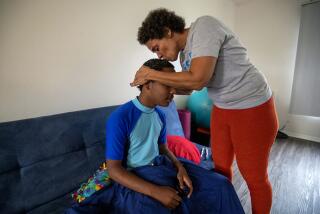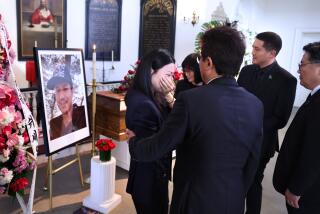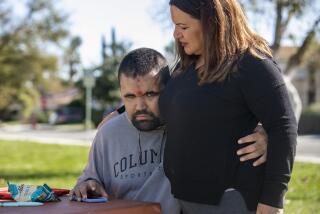State Ordered to Pay for Private Care of Man With Rare Ailment
- Share via
In an unusual legal decision, a Los Angeles Superior Court judge on Tuesday ordered the state to pay for the private care of a 19-year-old man suffering from a rare neurological disorder that prompts violent bouts of self-mutilation.
Andrew Wineman, who has suffered from the deadly Lesch-Nyhan syndrome since he was 13 months old, has been hospitalized at Fairview Developmental Center, a state-operated facility in Costa Mesa, for the past four years. For most of that time, his mother has fought for his transfer to a community-treatment center near her home in Encino.
Shelly Shaffer acknowledged that her son receives adequate medical care at Fairview but said that he spent most of his time alone in a room. Shaffer said her son told her that he was unhappy at the state hospital because he could not interact enough with others.
“He would tell me: ‘I hate it here, I’m angry, I want to go home,’ ” Shaffer said. “It would tear my heart out.”
Wineman’s home for 11 1/2 years, before he was transferred to Fairview, was a community-care home run by the United Cerebral Palsy/Spastic Children’s Foundation in Chatsworth, Shaffer said. He was moved to the state hospital because state officials determined that he needed 24-hour care, during which he would be confined by foot and hand restraints most of the time.
Superior Court Judge Miriam Vogel decided Tuesday that the teen-ager belonged in a facility where he would be allowed more freedom and the opportunity to socialize, said Valerie Vanaman, Shaffer’s attorney.
Wineman will be moved to a community-care home in Sylmar operated by the United Cerebral Palsy/Spastic Children’s Foundation as soon as there is available space, Vanaman said.
“His life expectancy is day-to-day, and she (Shaffer) really wants him where he wants to be,” Vanaman said.
The case has pitted local health-care officials against the state. State officials maintained that patients such as Wineman, who must be restrained, should not be accepted at community-care facilities, where they might endanger themselves and others.
Local health-care officials recommended last November that Wineman be transferred to a residential-care facility, but the state Developmental Services Department decided that such a transfer would be more costly than the program at the state facility.
However, the North Los Angeles Country Regional Center--an agency that matches disabled people with appropriate care centers--has devised a program for Wineman that would cost less than his treatment at Fairview. His current treatment costs the state $68,000 a year and the new program will cost $54,000, Vanaman said.
Although Wineman is confined to a specially equipped wheelchair and requires constant physical care, he is very sociable, his mother said.
“He can hold a conversation, he’s . . . totally aware of his environment,” Shaffer said.
Victims of Lesch-Nyhan syndrome suffer loss of motor control and the buildup of potentially lethal uric acid, but they are mentally aware. Wineman, one of 150 reported cases in the country, is mentally retarded but intellectually beyond many of the mentally retarded patients at the state hospital, Shaffer said.
But he bites his lips and fingers when angered and his self-mutilating tendencies have required that he be confined at the hospital, Deputy State Atty. Gen. William G. Schuberth said.
Schuberth said he does not believe Wineman will know the difference between a state hospital and a community care facility.
“I don’t really believe that somebody who has an IQ of 19 is going to have a large cognizance of his environment,” Schuberth said. “I think Andrew became unhappy at Fairview when his mother grew tired of driving out there.”
Schuberth said the state hospital, with its staff of trained specialists, would be the better place for Wineman. He contended that a less-restrictive facility would not provide the teen-ager with adequate supervision.
“I don’t see how it can be as good because care facilities don’t have as highly qualified, highly skilled, highly trained and experienced people as do state hospitals,” Schuberth said.
More to Read
Sign up for Essential California
The most important California stories and recommendations in your inbox every morning.
You may occasionally receive promotional content from the Los Angeles Times.










